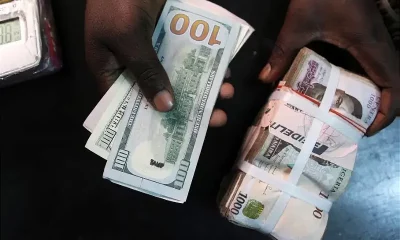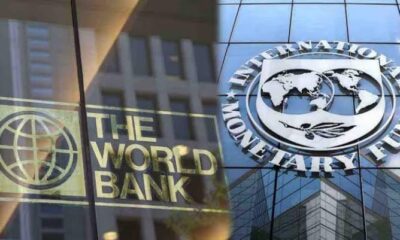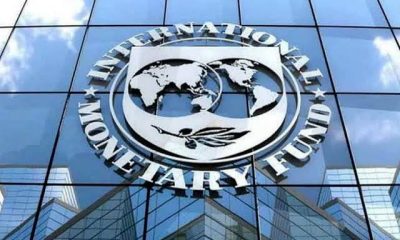Headline
Nigeria, others ask IMF, World Bank for debt relief

Nigeria and other developing nations are amplifying their request for debt relief within the G-24, an assembly of developing economies.
At the ongoing meeting of the International Monetary Fund (IMF) and World Bank in Marrakech, Morocco, the G-24, of which Nigeria is a member, presented a series of appeals.
The G-24 members voiced their apprehension regarding the escalating and substantial levels of public debt faced by numerous developing countries.
They emphasized that these nations are grappling with unsustainable debt, making it challenging for them to meet their repayment obligations.
The members of the G-24 while acknowledging the G-20 Common Framework, which is a debt relief initiative by the Group of Twenty (G-20) countries, noted that some of the poorest and most vulnerable countries are not benefiting from this debt relief programme.
They therefore called for a durable debt resolution specifically designed to address the debt problems of those excluded countries at the same time demanding for a more comprehensive and sustainable solution to alleviate the burden of debt for these countries and enable their economic growth and development.
Nigeria’s Minister of Finance and Coordinating Minister for the Economy Mr Wale Edun at the Africa Group 1 Constituency Meeting on the sidelines of the IMF/World Bank meeting stated that “our member statement urges an efficient debt resolution framework to support post-pandemic recovery and we indeed welcome Zambia’s debt restructuring agreement and call for swift resolution mechanisms for Ethiopia and Malawi.
The G-24 members also called for more concessional lending, especially for investments in global public goods and sustainable development such as affordable water and energy.
Wake Edun also called for the “elimination of export restrictions on fertilizer and grains, avoiding protectionist policies and leveraging the normalization of supply chains and shipping costs to reinvigorate global trade”.
At the G-24 meeting, Edun and other finance ministers expressed their concern with the progress on the IMF general quota review. IMF general quota refers to the monetary contribution made by each member country to the International Monetary Fund (IMF).
This quota determines the country’s relative financial and voting power in the institution. The quota is assessed based on each member country’s share of the world economy, including its GDP, openness to trade, and international reserves.
The IMF uses the general quota to fund its lending activities and to provide financial stability to member countries facing economic difficulties. It also plays a vital role in decision-making processes regarding policies and strategies for the organization.
Wale Edun and his fellow finance ministers reiterated their call for the IMF “to remain a quota-based institution in order to bolster the voice and representation of the emerging market and developing economies, who now account for a larger share of world GDP”.
Headline
EFCC bars dollar transactions, orders embassies to charge in naira

The Economic and Financial Crimes Commission has barred foreign missions based in Nigeria from transacting in foreign currencies and mandated them to use Naira in their financial businesses.
The EFCC has also mandated Nigerian foreign missions domiciled abroad to accept Naira in their financial businesses.
The anti-graft agency said the move is to tackle the dollarisation of the Nigerian economy and the degradation of the naira
The Commission, therefore, asked the government to stop foreign missions in Nigeria from charging visa and other consular services in foreign denominations.
The EFCC gave the advisory in a letter to the Minister of Foreign Affairs, Amb. Yusuf Tuggar, for onward transmission to all foreign missions in the country.
In the letter, the EFCC said it issued the advisory because the practice of paying for consular services in dollars was in conflict with extant laws and financial regulations in Nigeria.
In a letter dated April 5, 2024, which was addressed to the Minister of Foreign Affairs, Ambassador Yusuf Tuggar, titled: “EFCC Advisory to Foreign Missions against Invoicing in US Dollar,” the EFCC Chairman, Ola Olukoyede expressed dismay over the invoicing of consular services in Nigeria by foreign missions in dollars.
The EFCC cited Section 20(1) of the Central Bank of Nigeria Act, 2007, which makes currencies issued by the apex bank the only legal tender in Nigeria.
The letter read, “I present to you the compliments of the Economic and Financial Crimes Commission, and wish to notify you about the commission’s observation, with dismay, regarding the unhealthy practice by some foreign missions to invoice consular services to Nigerians and other foreign nationals in the country in United States dollar ($).
“It states that ‘the currency notes issued by the Bank shall be the legal tender in Nigeria on their face value for the payment of any amount’.
“This presupposes that any transaction in currencies other than the naira anywhere in Nigeria contravenes the law and is, therefore, illegal.”
The commission further stated that the rejection of the naira for consular services in Nigeria by certain missions, along with non-compliance with foreign exchange regulations in determining service costs, is not just unlawful but also undermines the nation’s sovereignty embodied in its official currency.
The letter continues: “This trend can no longer be tolerated, especially in a volatile economic environment where the country’s macroeconomic policies are constantly under attack by all manner of state and non-state actors.
“In light of the above, you may wish to convey the commission’s displeasure to all missions in Nigeria and restate Nigeria’s desire for their operations not to conflict with extant laws and regulations in the country.”
Diplomatic sources said yesterday, May 10, that some embassies were wondering whether the EFCC’s advisory represented the position of the Federal Government.
Headline
Prince Harry visits sick Nigerian soldiers in Kaduna

Prince Harry and his team visited the 44 Nigerian Army Reference Hospital in Kaduna to interact with wounded soldiers who are receiving treatment.
The Duke of Sussex is in Nigeria with his wife to champion the Invictus Games, which Harry founded to aid the rehabilitation of wounded and sick servicemembers and veterans.
Nigeria joined the Invictus Community of Nations in 2022 becoming the first African country to join.
Prince Harry’s visit to Kaduna came 68 years after his late grandmother Queen Elizabeth II visited the state during the time of the late Premier of Northern Region Sir Ahmadu Bello.




-

 Business5 days ago
Business5 days agoNigeria needs over $2bn to revive Ajaokuta Steel Plant, says Minister
-

 Headline5 days ago
Headline5 days agoSuspend cybersecurity levy– Reps to CBN
-

 Headline3 days ago
Headline3 days agoPrince Harry visits sick Nigerian soldiers in Kaduna
-

 Entertainment3 days ago
Entertainment3 days agoAMVCA Cultural Day: BBNaija’s Neo, Venita win Best Dressed Male, Female
-

 Headline5 days ago
Headline5 days agoTinubu resumes work after foreign trip
-

 News5 days ago
News5 days agoShan George’s money returned to Zenith Bank account
-

 Metro3 days ago
Metro3 days agoEx-Sports Minister laments after hospital neglected him for hours over N80000 deposit









